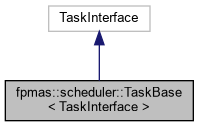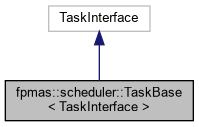#include <scheduler.h>
template<typename TaskInterface>
class fpmas::scheduler::TaskBase< TaskInterface >
Base task implementation.
Only the setJobPos() and getJobPos() methods are implemented.
- Template Parameters
-
◆ setJobPos()
template<typename TaskInterface >
Sets a list position associated to the Job represented by job_id, that can be retrieved with getJobPos().
There is no specific requirement about those methods, that can be used or not. However, Job implementations can take advantage of this feature to optimize Task insertion and removal in constant time, using an std::list as an internal data structure.
- Parameters
-
| job_id | Job ID |
| pos | list iterator that references the current Task within the job associated to job_id |
◆ getJobPos()
template<typename TaskInterface >
Retrieves a list position that was previously stored using setJobPos().
- Parameters
-
- Returns
- list iterator that references the current Task within the job associated to
job_id
The documentation for this class was generated from the following file:



